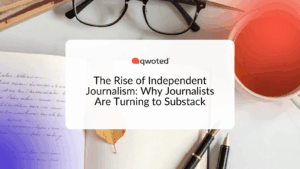
You’ve likely seen media requests for expert sources and wondered, “Does this apply to me? Am I really an expert?”
When building a personal brand or business, deciding when to position yourself as an expert can feel tricky. It’s easy to second guess yourself, but the unique value you bring from your experiences might be exactly what a journalist is looking for.
Tens of thousands of journalists are actively seeking expert input on Qwoted. Your fresh perspective could be the secret ingredient they need to shape their next article.
True expertise lies in having relevant, specific knowledge that meets a targeted need in an emerging story. In this guide, we’ll break down what it means to be an expert and help you assess your readiness to contribute to media stories. We’ll also give you the tools you need to confidently pitch yourself when the right opportunity comes along.
What Makes an Expert?
Often, expertise is associated with advanced degrees or decades of hands-on experience. In reality, a few years of relevant experience and fresh insights can be just as impactful.
Here we break down some core components of finding your expertise:
Having Verifiable Knowledge
Being an expert means knowing the facts and being comfortable enough to share them. When you can clearly explain a topic with verifiable information, you’re more likely to stand out.
Qwoted’s Success Manager, Shelby Bridges, explains, “A journalist is typically not an expert on the subject you are pitching. While you’re trying to help them with their story, keep in mind that you’re also explaining a complex subject to an audience that likely doesn’t know much about it.”
Always remember that referencing relevant studies or data to support your talking points strengthens credibility and helps journalists better understand the topic at hand.
Honing Your Confidence
Confidence isn’t about knowing it all—it’s about being secure in the knowledge you do have. Stand firm in your expertise, present it clearly, and stay open to further questions or discussions.
As Shelby recommends, “Make sure your credentials align with what the journalist needs and build your credibility as part of your pitch.” For example, if a journalist is looking for a dermatologist to discuss retinoids and you have an M.D., confidently share your qualifications.
If imposter syndrome starts to creep in as you share your expertise, remember that these feelings are normal and that practice is key to building confidence over time.
Being Transparent About Limitations
It’s impossible to know everything. If a follow-up question catches you off guard, be upfront about it. Shelby advises, “Do not feel obligated to answer all questions if they are outside the scope of your knowledge.”
When you’re honest with reporters about what you don’t know while clearly stating what you do know, you’ll come across as more trustworthy.
Committing to Lifelong Learning
Expertise isn’t static. The best experts are always learning, staying on top of the latest industry trends, and refining their knowledge. There are many ways to commit to learning outside of academia, such as webinars, workshops, industry newsletters, and online training.
Qwoted’s Media Insights feature is a great way to keep up with industry trends and stay updated with what journalists are looking for. Regularly checking our Media Insights can help you understand which keywords are shaping media coverage in your industry. This allows you to tailor your pitches to align with those topics.
I’m an Expert Without Media Experience, Can I Still Pitch?
Absolutely! There are millions of subject-matter experts around the world who haven’t harnessed the power of media coverage (yet). If you see a request that fits your knowledge and insights, journalists want to hear from you. Remember, everybody has to start somewhere.
Start by pitching to smaller outlets or niche publications to build your confidence.. Over time, you’ll sharpen your skills and gradually build your portfolio, setting you up for success when pitching to larger publications.
4 Tips to Pitching in Qwoted
- Pitch Within Your Means: Instead of pitching to any opportunity within your industry, find relevant stories that align with your specific areas of expertise.
- Be a Trendsetter: Keep industry trends in mind as you pitch. Timely insights are often rewarded by the media.
- Live as an Expert: Don’t limit yourself to publications, get creative and write blog posts and share your insights on socials to show the world your expertise.
- Strategize Success: Remember that the key to success is finding a strategy that works best for your specific goals.
Happy Pitching!
Being an expert in your field can look different for each individual. It’s all about what you personally bring to the table.
When you align yourself with the right opportunities, stand confident in your knowledge, and share your expertise with full transparency, you’re ready to pitch yourself to the media.
Feeling ready to share your expertise? Sign up for Qwoted to see what journalists are searching for, and start pitching your insights today.


